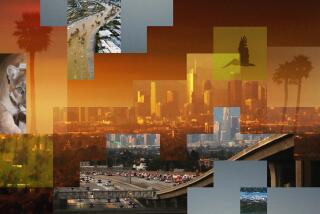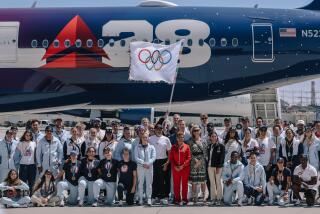Bogota Mayor Bans Private Cars for a Day
- Share via
BOGOTA, Colombia — Puffing on bicycles up the steep hill of La Suba Avenue, riding rented horses to lunch or simply catching a bus to work, residents of this capital city left their cars at home Thursday in a bold experiment in ecology consciousness.
“Day Without a Car” was Mayor Enrique Penalosa’s audacious attempt to lure residents out of the 700,000 private automobiles that regularly clog the boulevards and pollute the air of this high-perched city. From 6:30 a.m. to 7:30 p.m., buses and taxis were the only motor vehicles allowed on city streets cordoned off to create bike lanes.
Modeled on a French experiment, it was Latin America’s first attempt to induce all the residents of a major city to leave their cars home on the same day--all day.
Bogota has already instituted bike lanes on Sundays and holidays and restricted the use of private cars during morning and evening rush hours. Even so, weekday traffic is often gridlocked and the capital still has the fourth-worst air pollution in Latin America, a highly polluted region.
Penalosa’s more drastic measure produced results: At noon Thursday, air pollution levels were 22% lower than average for this time of year.
Bogota residents must start thinking about alternative transportation, said Oscar Diaz, a member of the organizing committee for the no-car event. “If we continue at this rate,” he warned, “in 2020, the speed limit will be 5 miles an hour.”
The mayor has pledged that before his term ends in December, his administration will have built 200 miles of bicycle paths in this city of high-rises and no subway. Thursday’s combination of a festive atmosphere--and $12 fines for the 256 motorists who didn’t take the mayor seriously--was part of a campaign to persuade residents to use the cycle lanes.
Carrera Septima, the main boulevard through the colonial downtown, was thronged with skaters, joggers and two-passenger bicycle taxis.
Reporters from the celebrity magazine Jet Set and RCN radio interviewed cyclists and skaters from a 19th century carriage pulled by a matched team.
The day’s most enthusiastic supporters tended to be young, athletic residents such as Carlos Arturo Salazar, a 23-year-old clerk. He said he considered the bike ride from his home near La Suba Avenue to his downtown office training for a 10K race, because the distance was about right.
Bogota executives, normally impeccably dressed, arrived at the office in clothes that were informal even by the standards of casual Fridays in the United States.
Felipe Mayol, the 34-year-old marketing manager at Texaco Inc.’s Colombian subsidiary, donned bluejeans, a polo shirt and a baseball cap for his 15-minute bike ride to work.
At lunchtime, he and 24 colleagues saddled up for a ride around the city on rented horses, brought down especially for the day from a stable on the city’s outskirts. “This gets people together and unites the city,” he said as he sat down to lunch at a park cafe after the ride. “I just hope it doesn’t rain.”
But it did. By 5 p.m., when most office workers go home, there was a deluge.
“The weather really is not helping,” Camilo Mendez, 26, said as he huddled, shivering, with his bicycle under the awning of a small store, hoping the afternoon storm would pass.
Shortly after arriving at City Hall on Thursday morning after a four-hour bicycle tour of the car-less metropolis, a smiling Penalosa, not even short of breath, said, “We want to illuminate a different vision: that freeways are not how we are going to resolve the city’s transit problems.”
In reality, buses and taxis weren’t moving much faster than usual during the morning rush hour because of the large number of lanes set aside for cyclists and skaters.
As one radio announcer pointed out, “Day Without a Car” was an event for the privileged 14% of Bogota residents who own cars. “Most of us face ‘Life Without a Car,’ ” he quipped.
Even so, many of the privileged opted not to participate. The well-known actor Julian Arango, who lives in a hilly, rural area on the outskirts of the capital, said flatly, “I am going to stay home and watch movies.”
And even those who did participate weren’t uniformly enthusiastic. One cyclist in a business suit pedaled down Carrera Septima with a sign attached to his bike: “Going along with the mayor’s whim.”
*
Times staff writer Darling reported from Medellin, Colombia, and special correspondent Angel from Bogota.
More to Read
Sign up for Essential California
The most important California stories and recommendations in your inbox every morning.
You may occasionally receive promotional content from the Los Angeles Times.













